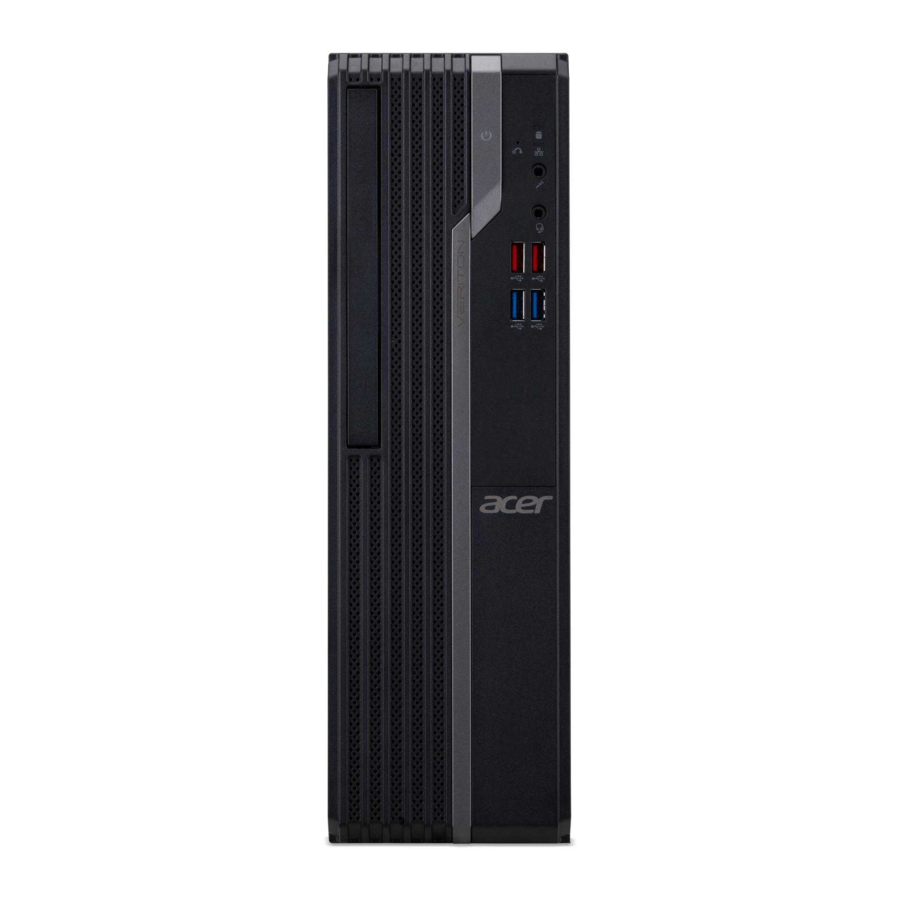
Advertisement
Quick Links
Advertisement

Summary of Contents for Veriton X4230G
- Page 1 Veriton X4230G(VX4230G) Lifecycle Extension Guide...
-
Page 2: Table Of Contents
Disassembly Procedure ......................3 Troubleshooting ........................15 Exploded Diagrams........................18 FRU (Field Replaceable Unit) List................... 20 To update your software ......................21 To remove your personal data ....................21... -
Page 3: Disassembly Procedure
Disassembly Procedure Safety Guidelines This chapter contains step by step procedures on how to remove and de-install components from the computer. Use the following safety guidelines to ensure your personal safety. Each procedure included in this chapter assumes that you are preparing your computer for recycling and disposal. By performing any of these procedures you acknowledge that any remaining warranty applicable to your computer will be voided. - Page 4 WEEE Annex VII Component These components are classified as requiring selective treatment. Pre-disassembly Instructions Do the following prior to starting any maintenance procedures: 1. Place the system on a stable work surface. 2. Remove AC power cord from the system and peripherals 3.
- Page 5 Chassis Door Removal 1. Remove the chassis door 1.1 Remove the 2 screws 1.2 Remove the left side cover...
- Page 6 ODD Removal 2. Remove the Slim ODD 2.1 Disconnect the ODD SATA cable and ODD power-cable 2.2 Press the tail of ODD to pushing it out of chassis 2.3 Remove the ODD NOTE: ODD has been highlighted with the yellow circle as above image shows. WEEE Annex VII component.
- Page 7 3.5” HDD Removal 3. Remove 3.5” HDD 3.1 Disconnect SATA cable and power cable from HDD 3.2 Remove two screws fastening HDD cage 3.3 Press the ODD cage down and pull it out...
- Page 8 3.4 Pull green rack out from HDD cage 3.5 Remove HDD from green rack NOTE: HDD has been highlighted with the yellow circle as above image shows. WEEE Annex VII component.
- Page 9 2.5” SSD Removal 4. Remove 2.5” SSD 4.1 Remove four screw and take out the metal bracket 4.2 Remove the green tool-less from metal bracket 4.3 Remove the 2.5’’SSD NOTE: SSD has been highlighted with the yellow circle as above image shows. WEEE Annex VII component.
- Page 10 VGA card Removal 5. Remove VGA Card 5.1 Remove a screw and open the PCI bracket 5.2 Press the PCI slot latch down and lift up the VGA card NOTE: VGA card has been highlighted with the yellow circle as above image shows. WEEE Annex VII component.
- Page 11 PSU Removal 6. Remove internal PSU 6.1 Cut the cable tie and disconnect the 4pin ATX_12V and 6pin ATX_ power cables form MB 6.2 Remove four screw fastening PSU and pull it out from chassis 6.3 Push the latch then take out the PSU NOTE: PSU MB/PSU FAN/PSU CAPACITOR have been highlighted with the yellow circle as above image shows.
- Page 12 MotherBoard, MEM, CPU, Cooler, WLAN, SSD, RTC Battery Removal 7. Remove the Main Board 7.1 Remove the acetic acid tape antenna from MB 7.2 Disconnect SATA and SATA-power cables from MB 7.3 Disconnect front panel cables from MB...
- Page 13 7.4 Remove the eight screws from MB NOTE: Circuit boards >10 cm² has been highlighted with the yellow rectangle as above image shows. WEEE Annex VII component. Please detach the Circuit boards and follow local regulations for disposal. 7.5 Release the two latch show bellow then remove the Memory NOTE: MEMORY has been highlighted with the yellow circle as above image shows.
- Page 14 7.7 Remove the CPU NOTE: CPU has been highlighted with the yellow circle as above image shows. WEEE Annex VII component. 7.8 Remove a screw fastening the M.2 SSD and pull it out of slot NOTE: SSD has been highlighted with the yellow circle as above image shows.
-
Page 15: Troubleshooting
Troubleshooting This chapter provides troubleshooting information for the Veriton X4230G Service Guide Power-On Self-Test (POST) POST Error Messages List Power-On Self-Test (POST) Each time you turn on the system, the Power-on Self Test (POST) is initiated. Several items are tested during POST, but for the most part transparent to the user. - Page 16 POST Error Messages List If you cannot run the diagnostics program tests but did receive a POST error message, use “POST Error Messages List "to diagnose system problems. If you did not receive any error message, look for a description of your error symptoms in “Error Symptoms List”.
- Page 17 BIOS Messages Action/FRU Memory Test: This message displays during a full memory test, counting down the memory areas being tested. Memory test fail If POST detects an error during memory testing, additional information appears giving specifics about the type and location of the memory error. Override enabled - If the system cannot boot using the current CMOS configuration, the BIOS can override the Defaults loaded...
-
Page 18: Exploded Diagrams
Exploded Diagrams Figure 1 System Exploded Diagram... - Page 19 Item Description Item Description Rubber foot LED sponge Black Screw Power sponge Side Cover L Power switch PCB HDD Bracket MB Rubber HDD Top cover #6-32*5 Screw #6-32*5 Screw HDD support Bracket HDD support Bracket HDD Rubber ODD Bracket HDD tool-less Rivet-1 HDD lens Rivet-2...
-
Page 20: Fru (Field Replaceable Unit) List
FRU (Field Replaceable Unit) List Please contact your local service center to find out how to obtain the part or replace your device... -
Page 21: To Update Your Software
To update your software Microsoft keeps pushing the latest Windows operation system to each unit. Acer post the latest software on website. Please visit https://www.acer.com/ac/en/US/content/drivers https://www.acer.com/ac/en/CA/content/drivers To remove your personal data Option 1: Select Start > Settings > Update & Security >...
Need help?
Do you have a question about the X4230G and is the answer not in the manual?
Questions and answers